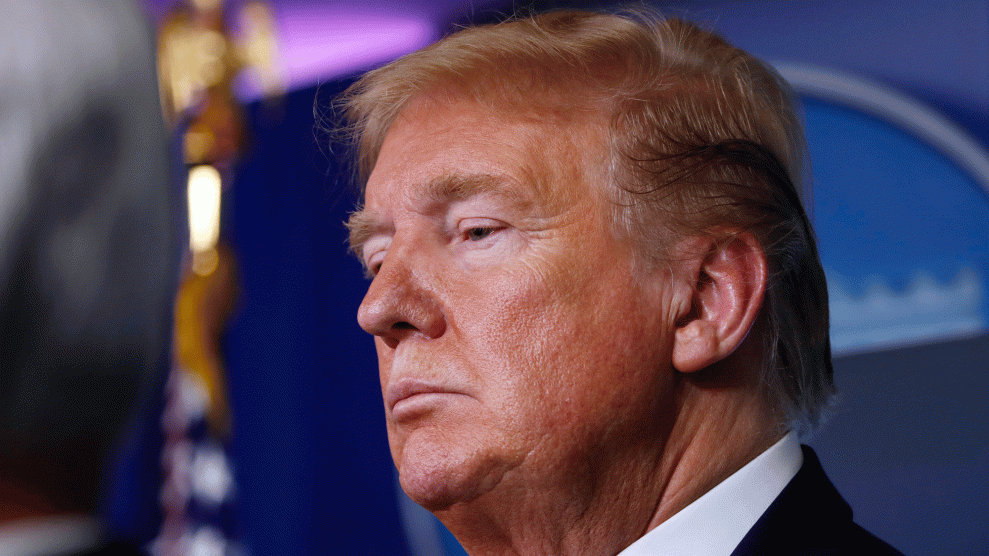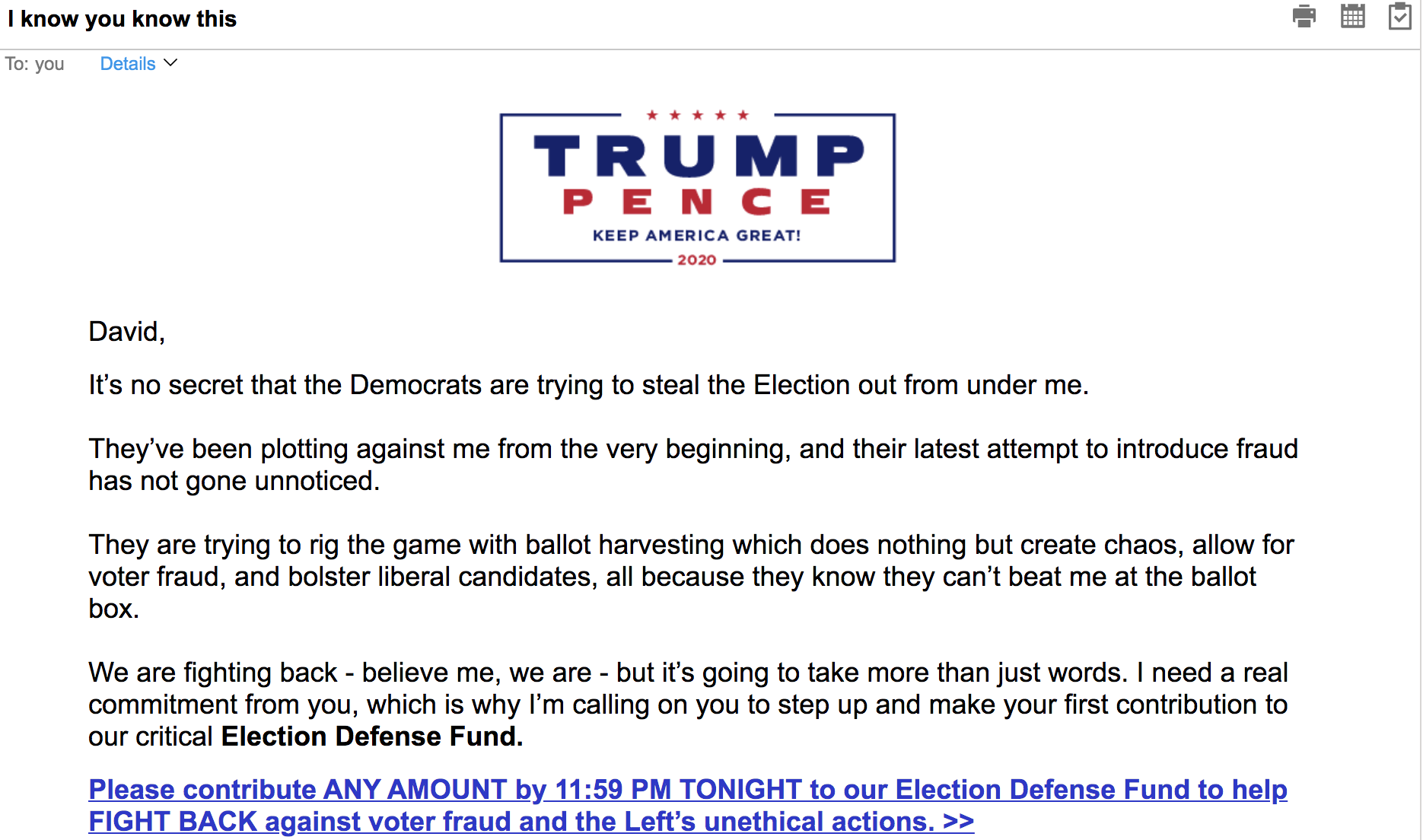
Alex Brandon/AP
In the middle of a horrific crisis claiming the lives of thousands of Americans a day, President Donald Trump decided it was a fine time to undermine democracy.
Last week, as the coronavirus continued to burn through the United States, Trump’s campaign sent out an email from him soliciting contributions for his reelection effort and made a dangerous accusation: the 2020 election cannot be trusted. The first line of the email—which likely was sent to hundreds of thousands, if not more, people on Republican and conservative email lists—reads, “It’s no secret that the Democrats are trying to steal the Election out from under me.” The letter asserts that Democrats have “been plotting against me from the very beginning” and are deploying “fraud” to “rig the game” because “they know they can’t beat me at the ballot box.”
Less than seven months from Election Day, Trump was trying to undermine the process and cast doubt on its legitimacy. Without spelling out the matter at hand, he was responding to recent calls for an expansion in voting-by-mail as a way to hold elections safely during a pandemic. His letter referred to possible “chaos” from “ballot harvesting”—a term for volunteers or political operatives collecting absentee or mail-in ballots. But there has been no proof that such activity leads to significant fraud. Seventeen states already have some form of mail-in elections, and many others allow for absentee voting through the mail. (Remember, Trump falsely insisted after the 2016 election that there had been “millions” of fraudulent votes cast against him.)

So as the country struggles with how to hold elections during a pandemic—look at the mess that occurred recently in Wisconsin when Republicans successfully fought to hold an election that the governor wanted to postpone—Trump is telling his supporters that he (and they) are victims of a dark plot to rig the election. This echoes his demagogic rhetoric from the 2016 campaign trail. He repeatedly insisted then that he could only lose due to shenanigans, contending that rampant fraud was being mounted to swipe that election from him. He devised a nonsensical paradigm: if he won, the election was honest; if he lost, the election was crooked.
His rhetoric during that campaign was treacherous in and of itself; Trump was inviting his supporters to disbelieve the election results, should he lose. But it harmed American democracy in another critical way. His talk of a tainted election influenced how President Barack Obama and his top aides responded to the ongoing Russian attack on the election. With Trump griping about the contest being rigged, Obama and his crew feared confronting the Russian assault (which was helping Trump) too forcefully in public; they worried that Trump would point to such action as evidence of the non-existent “rigging” he was decrying. That is, because Trump was raising unfounded questions about the election, the Obama White House did not want to introduce into the mix other concerns about its legitimacy—which Trump could use as ammo. (“See? Obama says the Russians are helping me? They’re just doing that to cheat and rig the election against me.”) Trump’s trash-talking of the election boxed in the Obama administration, and Obama, rightly or not, opted to not highlight Moscow’s intervention in the campaign to the degree he could have. (Obama and his advisers tended to believe that Hillary Clinton would win, despite Moscow’s effort, and that the Russian interference could be addressed after the election.) This year, as Trump administration officials have warned that Russia again is interfering in the American election, Trump once more is pushing a baseless allegation of voting fraud as a diversion.
One thing Trump is good at is setting up narratives. He told his supporters in 2016 that a Trump loss would be evidence of a dishonest election. Consequently, if he had failed, he had his folks ready to believe Trump had been swindled and primed for a holy-hell reaction. Trump recently has created a self-serving plot line for the coronavirus crisis: if the situation improves, he can claim credit; if it does not, the governors are to blame. And now he’s jeopardizing the 2020 election by establishing a risky cover story: the Democrats are attempting to rip off the voters and stop Trump with illegal means.
And Trump is trying to raise money with this pitch. His letter asks its conservative and Republican recipients to send his campaign money it can use for an “Election Defense Fund.” A reader who clicks on the donation button is directed to a page requesting between $5 and $2800 dollars. The fine print at the bottom of the page notes that the money will go to the Trump campaign and the Republican Party in a 75/25 split. Maybe a donation will end up at an election defense fund. Maybe it will not.
Trump has been trampling on norms since he tramped into the White House. And much of the public and media has become inured to his creeping authoritarianism. In any normal circumstance involving any normal presidential candidate, a charge that the other party is stealing the election would prompt headlines, scrutiny, and a demand for proof. It would provoke cable television outrage. What’s the evidence? What harm does such a talk do? Does this encourage disrespect for elections and discourage voting? How could a president be so irresponsible and reckless with his rhetoric and so cavalier about undercutting American democracy? This email drew no such attention.
Trump’s excesses and extremes have been normalized. They no longer shock. Some barely even seem to warrant comment. After all, what’s one fundraising letter when Trump is profoundly mismanaging the US government’s response to a pandemic, lying, bullying, and proclaiming his own greatness at the daily Trump follies to distract from his actions and inaction that have contributed to the deaths of tens of thousands of Americans? Yet this give-me-money missive is a double-warning. First, Trump can be expected to continue to push this line in the coming months to sabotage the election. Second, he may well be preparing to deny results that do not keep him in the White House. While the nation is fixated on public health and economic crises of the moment, Trump and his lieutenants are looking ahead to the fall and readying an attack on the foundation of American self-governance. He is signaling how ugly this election will be and how much damage he is willing to cause to protect his own political health.
















